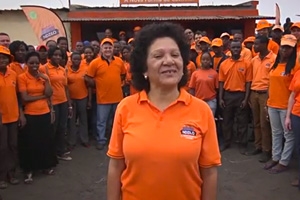Business
Entrepreneur Brings Progress to Africa with Clean-Cook Stoves

Thelma Venichand, BSBA '89, and her business partners are bringing clean cooking alternatives to Mozambique, one stove at a time.
When Thelma Venichand came to Washington, D.C. in the late 1980s, she was a recently divorced immigrant with a young son, looking for a fresh start. She knew she needed an education to move up in the world and saw that opportunity at Kogod.
Venichand and her son eeked by on her $800 per month scholarship — her son often slept in the library while she attended class — but she triumphantly earned her BSBA in 1989. Now she's a successful entrepreneur who has brought a cleaner cooking alternative to her native Mozambique.
Giving Back
Even during her years in the U.S., Venichand's heart remained in Africa. She always wanted to find some way to give back to her community in Mozambique and to make living conditions for women and children better.
The spark of an idea came to her one day while she was working with farmers in rural Africa who were in need of markets to sell and exchange excess produce. Nearly every family Venichand visited had mounds and mounds of cassava—a starchy, fibrous food staple for the region—lying around.
"Cassava root is something everyone has in abundance. It doesn't need any special storage or anything. I knew if I could find a way to give value to it, I'd be on to something," Venichand said.
For the next few years, Venichand explored the possibilities of cassava whenever she had a free moment.
"It was always on my mind," she said. "I was constantly researching alternative uses in my spare time."
Finally, she stumbled upon a use that could change everything: cassava could be converted into a form of ethanol and used to more cleanly power stoves, improving the air quality for working women and their children.
"It's estimated that the traditional charcoal stoves used by these women to cook for their families produces as much smoke as a two pack a day [cigarette] smoking habit," Venichand said.
Lessening the dependence on charcoal for cooking would also help curb the country's rising deforestation crisis.
Building the Business
For the next five years, Venichand and her now-adult son, Lutchi Klint, sold their cassava ethanol gel and clean cook stoves to the residents of Maputo, Mozambique.
While Venichand and Klint believed in their products and the benefits, the Mozambique government was less sure and imposed heavy taxes, making the stoves less attractive to low-income families.
"Those early years were a struggle," Venichand said. "Women liked our product, but because of tax impositions, it wasn't a reasonable replacement for the charcoal they could already get for practically nothing. We needed to find a way to make the cassava fuel more affordable."
The answer to Venichand and Klint's problem came in the form of new business partners. In 2011, they met entrepreneurial team Greg Murray and Sagun Saxena at a biofuel conference in Mozambique. The four decided to go into business together, with Saxena and Murray focusing on recruiting investment partners while Venichand and her son continued to get the product to the women of Mozambique.
In 2012, the group's new company—CleanStar Mozambique—formed a partnership with Bank of America (BOA). BOA provides liquid capital and purchases carbon credit offsets to subsidize the cost of clean stoves and cassava fuel. More than 30,000 households in Maputo are now using the cleaner stoves.
"The women who buy these stoves are barely scraping by, barely providing for their families as cooks and cleaners for the rich population of Mozambique," Venichand said.
"Thanks to the subsidies we're now able to provide, these women can have clean stoves in their homes like they see in the mansions where they work. It almost brings me to tears to see it."
In addition to her continued work with CleanStar Mozambique, Venichand also makes regular speaking appearances at energy conferences on behalf of the Global Alliance for Clean Cookstoves, an international group dedicated to clean cooking backed by such partners as the U.S. Department of State and ambassadors like actress Julia Roberts.

